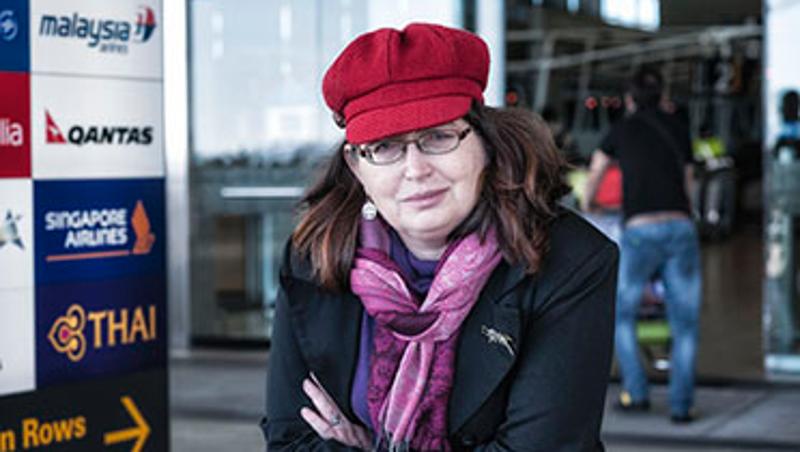
A QUT project to make airports more accessible for people with dementia has been awarded nationally competitive Dementia Collaborative Research Centres funding; one of five QUT projects to receive a combined total of almost $300,000.
Dr Maria O’Reilly, QUT Research Fellow with the Dementia Collaborative Research Centre: Carers and Consumers (DCRC:CC) will create a user guide to Brisbane Airport’s Domestic and International Terminals for travellers with dementia to reduce their anxiety about travel. She will also produce a resources kit for airport staff to better address the needs of customers with dementia.
“Despite the fact many people living with dementia fly, no guidelines to dealing with such passengers currently exist for airlines or airports,” Dr O’Reilly said.
“Many people look forward to travelling as they grow older, either for leisure or to visit family and friends; this includes people living with dementia yet little attention has been paid to this passenger group even though millions of people worldwide live with the condition.
“While improvements have been made to transport infrastructure for people with mobility impairments, not much has been done to improve accessibility for those with cognitive impairments such as dementia.”
Dr O’Reilly said a good airport experience was critical for people with dementia.
“Our ‘Infrequent Flyers?’ study last year investigated the topic from the perspective of people with dementia, their companions, airport staff, and air crew. We found that the most challenging part of air travel for people with dementia was managing at the airport,” she said.
“A second study is still underway and is an airport audit using the Dementia Friendly Communities Environmental Assessment Tool to determine the ‘dementia friendliness’ of Brisbane Airport’s Domestic and International Terminals.
“This will be completed by July and will complement the results of the Infrequent Flyers project. We can then develop educational materials for use by airport staff and by travellers.
“For staff, we propose to work with those who have direct customer contact. The educational resources will be evaluated by participants in the training, who will also be followed up after three months to find out whether the materials helped them assist passengers with dementia.
“For travellers with dementia and their companions we will develop a user guide to assist navigating through the different zones of Brisbane Airport’s Domestic and International Terminals. For example, it would outline what to expect in the bag screening area or Customs.”
Dr O’Reilly, who has been collaborating with Brisbane Airport Corporation, said the airport guide would be evaluated by people living with dementia and/or their companions to ensure its usability. Once the two sets of resources have been developed, evaluated and refined, they will be publically launched and made widely available.
“Ultimately the resources we develop could be adapted for use in other airports in Australia and worldwide, and in other formats, such as a mobile phone app,” Dr O’Reilly said.
Leonie Vandeven, Brisbane Airport Corporation spokeswoman, said, “This project is very important to Brisbane Airport because we know that travelling through an airport can be an overwhelming experience for some people, especially those with illnesses, disabilities or special needs.
“These new guidelines will complement Brisbane Airport’s existing Disability Access program and will be integrated into customer service training for airline staff and other airport workers, including retailers, security, cleaners and volunteers to name a few.
“It really is just the beginning of further research and development that will support travellers with a range of disabilities and make their visit to the airport less stressful and more enjoyable,” said Ms Vandeven.
Other QUT-led projects awarded Dementia Collaborative Research Centres funding include using music to reduce risky aspects of wandering in people living with dementia in residential care; the development of a Carer Ready Guide in the event of natural disasters; the provision of guidelines for day centre respite care; and the care of people with dementia in emergency departments.
According to Alzheimer’s Australia there are now more 353,800 Australians living with dementia, a figure expected to triple by 2050 without a medical breakthrough.
Of these, approximately 25,100 have Younger Onset Dementia (a diagnosis of dementia under the age of 65) while around 1.2 million people are involved in the care of a person with dementia.
The World Health Organisation says the number of people living with dementia worldwide is currently estimated at 47.5 million and is projected to increase to 75.6 million by 2030.
QUT is part of a national collaborative group of five major Australian universities that form the ATN (Australian Technology Network of Universities).
Media contact:
Amanda Weaver, QUT Media, 07 3138 1841, amanda.weaver@qut.edu.au
After hours: Rose Trapnell, 0407 585 901, media@qut.edu.au


